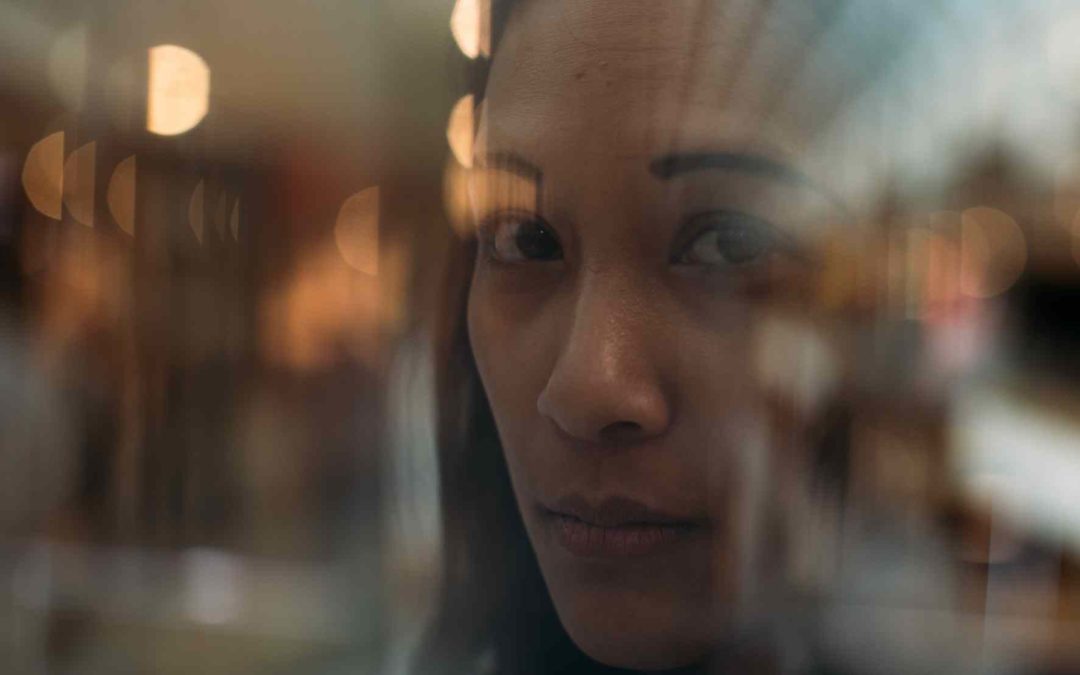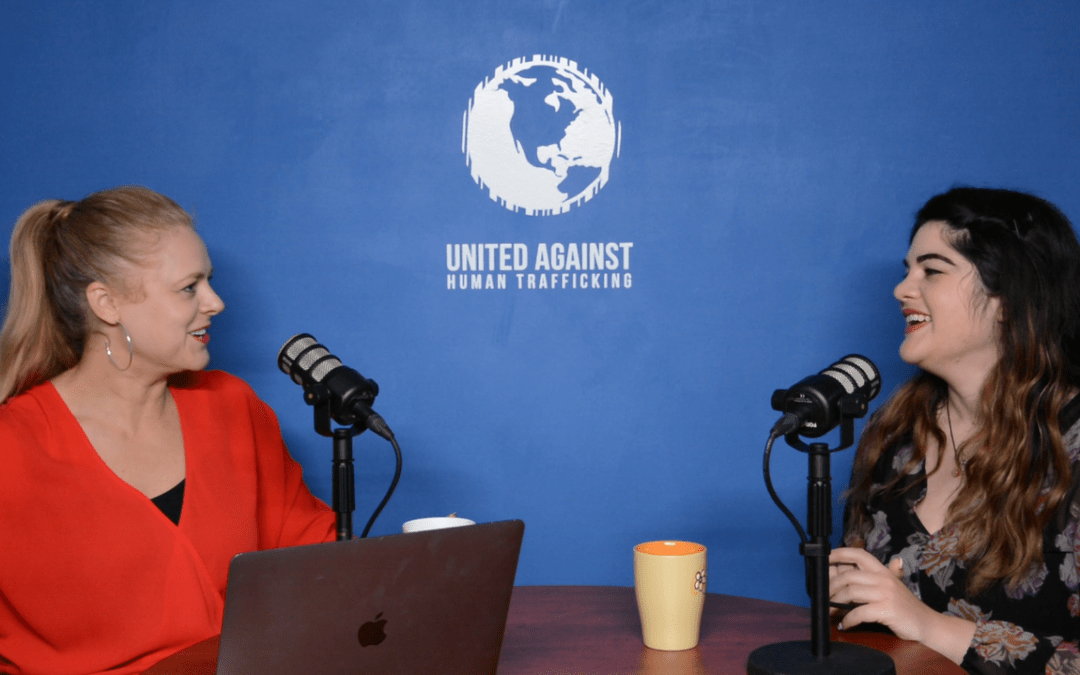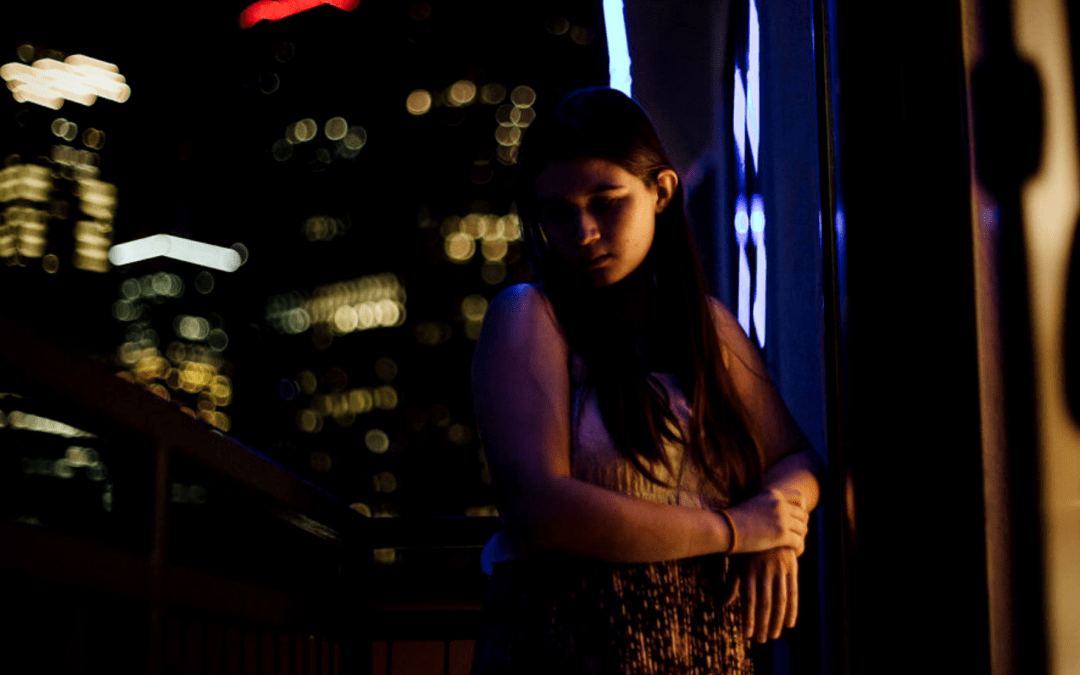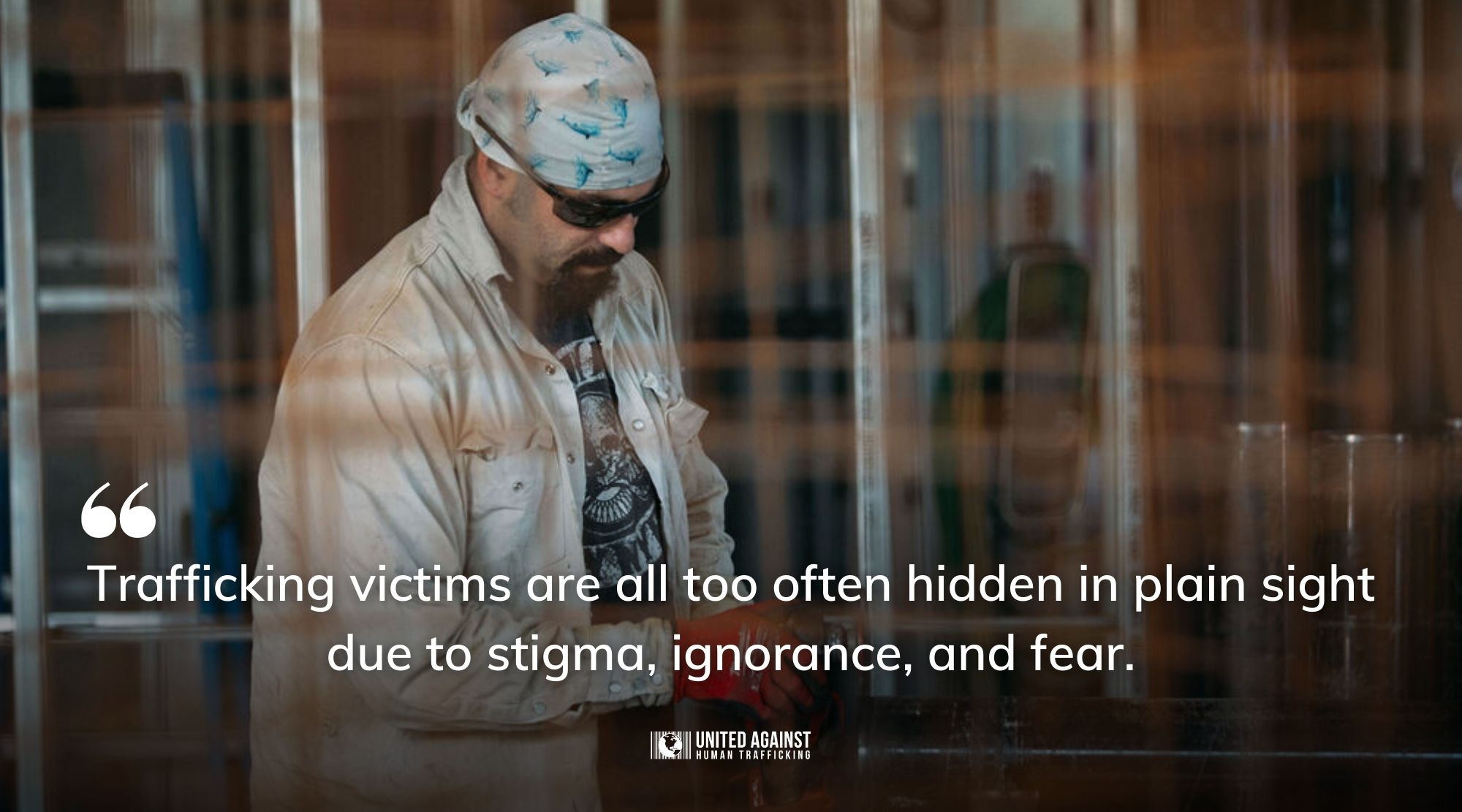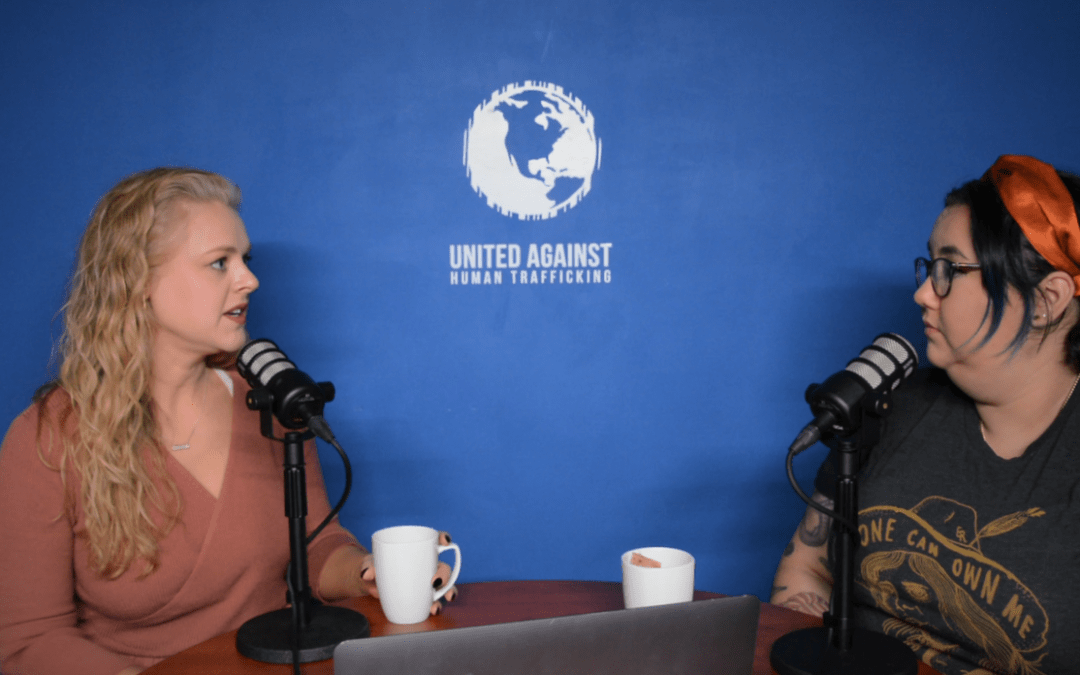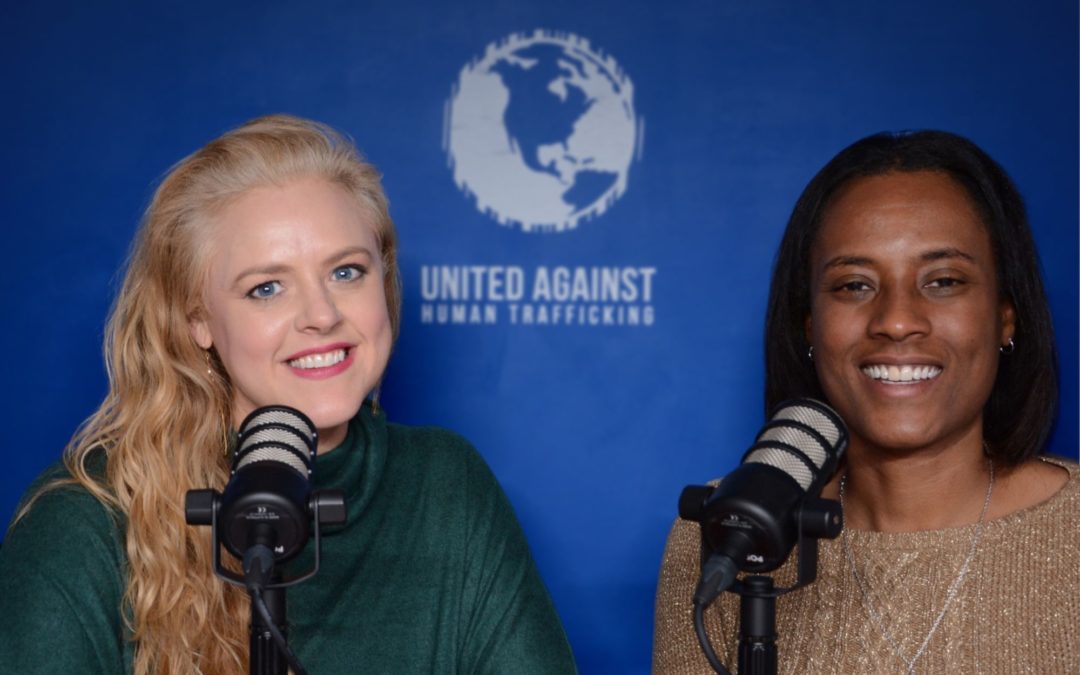Elaine Andino 0:00
Welcome to I Dare You, a podcast by United Against HumanTrafficking, where we mobilize you to fight exploitation. I’m your host, Elaine Andino. We believe that together, we can mobilize the fight to end human trafficking. So today, I’m really excited because this is actually our very first podcast. We have been talking about this for quite a while. So we’re super excited to finally launch in 2020. So at least one good thing to come out of 2020, as this was a difficult year for all of us. So this is a big one. And today, my guest is our Executive Director, Timeka Walker. Timeka Walker has been part of this organization for the last five years, almost six years and is also a dear friend of mine, and is just really grounded not only in this movement, but she’s a social worker. So she’s got years of experience as a social worker. And she and I have lots of conversations regarding the movement and where it’s been and where it’s going. So she’s got a lot of really great ideas. So I’m excited to delve into that. So Timeka, thank you so much for being here with us today.So you’re an LMSW, you’re a social worker, you have a heart for people. I mean, I know you well, you have a heart for people and injustice and marginalized communities. So I’d love to hear a little bit about you just about your background in general.
Timeka Walker 1:22
Well I’m really excited to be here. And thank you so much, Elaine; it’s a blessing to spend this time with you and be able to kind of talk about the work that we’re doing in the community and just be able to share my heart about the movement as a whole. So yes, I’ve been a social worker for a very long time, have really enjoyed throughout my career, working with marginalized communities and vulnerable populations, and really diving into what I think matters most of the world is being of service and being able to serve others. So I started my career Early on working with impoverished communities, particularly in Dallas, where I’m from, but also here in Houston, and worked in the Second Ward for many years with youth that were at risk for many things, and gangs, and things of that nature, and really built programs around helping youth understand the importance of being a part of the world in a way that was positive. And so really enjoyed that work for many years. After that, I transitioned and did work with HIV positive folks in the community, homeless individuals who had been through many treacherous years of their lives suffering with the illness, as well as mental health issues, substance abuse. And so really was there at my last job for about 10 years and really enjoyed that work and learned a lot about myself, which I think is really important, particularly as a social worker, you do a lot of work around how you best serve the community is by first serving yourself and learning about yourself and be able to kind of give back in that way. So I really enjoyed that time. And really delve into a lot of just issues around discrimination, whether it was for LGBTQ communities, whether it’s because of the virus itself and family members, disowning their, their own children because of the illness, so really got to learn a lot about myself, it was very hard work, but really, you know, rewarding work. And really, at some point, I’ll probably do that work again, really learned a lot about just the reality of how hard people’s lives can be when they’re disenfranchised, for many reasons.
Elaine Andino 3:26
right, yeah. And there’s a lot of parallels in what you talked about as far as the work that you’ve done before almost honing in your understanding of what it means to be marginalized, discriminated against how people end up in certain situations, and then are exploited, which is so similar to the conversations we’re having now that a lot of people just don’t understand that about the human trafficking movement, which I know we’re going to talk about more in a little bit. But one of the things that people talk about, you know, it’s being kidnapped, and that’s what they think it is. Whereas we’ve learned, it’s really not – it’s the systemic issues that are marginalizing them, and causing them to be exploited. Yeah. And for our listeners, we’re lucky enough to live in a city where we have a pretty robust response to human trafficking. So unfortunately, we have a large human trafficking problem, but we have a large community of organizations that fight human trafficking, a police force that really works alongside us, we have a city that has a very cohesive response to human trafficking. And we work together whereas other cities don’t have that. However, the human trafficking movement is still young. And so there’s a lot that still needs to be built up. So in the last six years, what are some of the kinds of shifts that you’ve seen from when you first got here to now?
Timeka Walker 4:40
Back in 2015, when I started at the organization, we were very small organization, always, you know, share that we had two staff members and we’ve grown tremendously. Thanks for the great work that Elaine has done as well as all of our team members. You know, just building up the movement as a whole and trying to really elevate the work that we’re doing so when I first came on board The biggest piece that I say that I saw was how disjointed the movement was. I think that folks were doing the best that they could and trying to honor the survivors and doing the best work that we could. But people were really in silos. And so when I came on board, we had just changed our name from Houston rescue and restore coalition to united against human trafficking. And so I talked extensively with our board and our team at that time and throughout the years about the importance of uniting the community, and really want to be in that unifying force in the community. So as a leader of the organization, I wanted to make sure that whatever I did, we’ll be focused on bringing that unification, I believe back to the to the movement. And so over the years, I’ve seen all of us grow, you know, people coming together through our coalition, which I love and talking about our our differences and understanding all the similarities that we had in the work that we were doing, and focusing on those similarities. And finding the kind of wherewithal within us as an organization to ensure that we’re leading in a way to where people can understand we’re not just talking the talk, but we’re walking the walk. And so as an organization, I want to always represent that. And so as I’ve seen the change, particularly for the past two or so years, where EDS of all the organizations are coming together, team members of doing work from one organization to the next and collaborating, we’re collaborating on grants for funding opportunities. So not just talking about unification, but actually being about it as a as a movement. And so I love the fact that that’s happened because I think, as a whole, it’s going to best serve the survivors, right? If we’re unified as a movement, right? I’ve seen that change significantly in the past two, two and a half years, right?
Elaine Andino 6:47
It’s good, just seeing how so many organizations have gone from kind of an inward focus to an outward focus and collaborating together. Because I mean, as we say, here all the time, there’s no way we can all do everything and offer operate every service. So I know for us, we look to fill in those gaps. So looking to see, okay, what organizations are doing what let’s don’t compete, unless there’s the need is that big, and there’s not enough workers doing it, let’s figure out how we can fill in the gaps. And I think a lot of organizations are taking that, okay, I don’t necessarily have to have a program, you’ve got that program. Let’s figure out now how we can collaborate, which is huge, because the bottom line is exactly what you said. Survivors then are connected to real continuum of care. I also would love to talk just about kind of where we’re going, and as a movement as a whole. And I don’t think we could do that without talking about some of the things that happen in 2020. Right? I’d love to hear from your perspective on the intersection between racism and human trafficking, we talk a lot about that an organization is something that has been woven in our DNA for a long time, not just 2020. For you, what was 2020 signify? And how do you think that shaping the movement to come?
Timeka Walker 7:56
I think about that find a quote or something that will relate to our my experience, because I speak into my experience as a leader of this organization is also as a African American woman, leading an organization that’s really pushing for our mission to end human trafficking. I think the biggest piece was kind of a collective sigh of relief that I felt happened after George Florida. What I mean by that, for me is that relief came because people finally acknowledged that, Oh, this is really a reality in our world, and particularly in the world of human trafficking, and how the disparities that impact, particularly women of color, and how we have to really elevate that conversation and talk about it, even though it may be uncomfortable, and how so many leaders in the movement, particularly want to give a shout out to Elijah rising and mica, who I love so dearly. We did a talk about the importance of elevating that conversation and within the work that we’re doing, and I’m a person that believes in hope more than anything, I don’t really, I’m not a person who dives into the dark pieces of the of the world of life too often. And so I try to elevate hope. And I think for me, what I experienced after an aftermath of George Floyd was a lot of hope, particularly for our movement. Because I do believe people were in a space of acknowledging the realities of systemic racism and how it impacts people of color and women and and men and LGBTQ communities and all of that, and but at the same time, acknowledging same time, beyond acknowledgment moving forward, and what can we do now? And how do we come together and unify as we push forward?
Elaine Andino 9:38
Do you think that it is possible for us to effectively fight human trafficking without acknowledging the part that systemic racism plays in our country?
Timeka Walker 9:50
I think that’s that’s such a complex conversation to have, and to kind of talk through so I really want to honor the question. By just acknowledging just how complex it is, the answer would be so for me, the quick and the dirty is, we have to acknowledge it, it’s a huge part of the, the what’s happening in the community, particularly with survivors, it’s real. And we have to make sure that we do our best as a movement to do whatever we can to acknowledge it. So particularly because of marginalized communities, when it comes to the socio economic factors when it comes to lack of housing, lack of education, lack of resources as a whole, you know, those things lead to folks being more vulnerable. And I think it’s important to always talk about the vulnerabilities. I don’t think we talk about that enough in our movement, in particular, what leads to folks not having choices in their life. And so this becomes a choice that they have to make. And it’s not their fault, not because of what they’ve done. It’s literally because of circumstances. And so I think it’s important, as folks who are advocates for human trafficking survivors, they understand it’s a very complex issue. And if we’re not willing to acknowledge the societal implications that are surrounding the issue, then we’re not doing the best service. And so my hope is that through the podcast, and through just other educational opportunities, that we’re able to continue to elevate the conversation of the experiences, historical experiences of folks who are victims of human trafficking, and honoring that, and the only way you do that is by talking about it, and making it a an ongoing part of the conversation we’re having as a movement. And I think we’ve done a disservice as a movement, because we haven’t had those conversations, we don’t have enough diversity in the movement, folks who are providing care to victims of human trafficking, it’s not diverse enough, and what I mean, all kinds of diversity, not just racial, ethnic diversity on all levels. There’s a reason why folks who are you know, homeless youth on the street, because they’re being kicked out because they’re LGBTQ, for whatever reason, and you’re asking them to come and be a part of a program that say, is faith based, they may not want to be a part of a program that’s faith based, but we’re one of the only organizations that’s not faith based. And there’s a reality that comes with that. So I think that just honoring all the pieces of a human being. And the way you do that is, I think, I think, first and foremost, is acknowledging who they are their ethnicity, their belief system, and making that be a significant part of the programming and the service that you’re providing to those.
Elaine Andino 12:26
And as an African American woman who is leading an anti human trafficking organization, your experience has been, you’ve one of the only African American women leading an anti human trafficking organization. So you’ve been able to look around the room and say, hey, there’s some really important conversations we’re not having, and other people haven’t even thought to have those conversations. So it’s been a long time. So when you talk about kind of the relief, I can understand that based upon, you know, all the time that we’ve spent together, just oh, now everybody else is willing to have these kinds of conversations. One, that’s amazing. I know for you just personally, which if you want to speak to that you’re welcome to But personally, but then also, we’re always looking at the client, what is the client experiencing? And if the client doesn’t look like the other people in the room do? Are we sure we’re giving them the best care and we’re understanding where they’re coming from. And we’re understanding the systemic and historical context in which they’re coming from, that you just mentioned.
Timeka Walker 13:20
I think that was beautiful. I think the most important thing was just really trying to find a way to be able to identify with folks in their experience. And I think as a social worker, personally, that’s what we’re how we’re trained is meeting people where they are, and the only way you can truly meet someone where they are, is really ventured down that road and walk with them as a travel companion in their journey in truly, as a companion and as an equal. And I think in it’s important in the movement for us to see our clients as equal, they’re human beings, right? The people who have experiences, you know, we all have experiences. And I think, at times because of what they’ve been through, and we hear their stories, we see ourselves as different at times and them when the reality we’re living the same parallel worlds is just in a different kind of experience in a different way we look at how things are. So I think the more we can see the commonalities we have in our survivors and the folks that we’re serving, the more will and I think will better serve them.
Elaine Andino 14:19
Right and it goes back to a conversation, I know that we have all the time as a as a movement, when we’re talking to somebody about human trafficking, the first thing that people think oftentimes is, oh, they were kidnapped, or, you know, and they need to be rescued. And so we have that and we’re starting to tell people well, you know, it’s really not about being kidnapped, that’s really actually just a tiny percentage of all human trafficking. So that leads to the next question of, wait, what? How do they end up in that situation? So you start talking to people about the conversion part and the grooming part and you start talking to them about the vulnerability side and you can lose people at that point in time because they think, oh, why would that would never happen to me. And so they went from meeting, the feeling of needing to save somebody who was like, brought into a situation that they didn’t want to be in, obviously didn’t want to be in to trying to understand how did a person end up in exploitation? How did they end up in human trafficking, when a lot of times they’re only filtering it through their own experiences and their own lens. So if they’ve not spent time in any type of marginalized community, or there’s so many teenagers being trafficked these days, you know, and so they haven’t, they don’t know what it’s like to live as a teenager in this world, because it’s entirely different than when we were teenagers. And they’re not looking at through those lenses, they could miss what society the push and pull factors of society that is creating human trafficking and is allowing it to flourish. And so I think it’s super important for us to be having these conversations. So people can start to connect those pieces and understand how we all have parts to play in it, whether it’s indirectly or directly. And the only way that we can start understanding that is if we have open and honest and really raw conversations a lot of times I mean, and that’s one of the reasons why some people I think we want as naturally maybe to avoid it is because they’re tough conversations, you know, and they require some kind of deep change not let me go in jerk you out. Now everything’s okay. There’s deeper things at play here. So where would you say that the movement and the next, let’s say, five years to be headed towards? What were some of the changes that you would be hopeful to see and that you think are in place?
Timeka Walker 16:38
Well, I think that as a whole, we’ve elevated so much, like I said, in the past couple years, that I think the next phase for us is to really build infrastructure, and to really build opportunities within our organizations, for survivors, to be employed, to elevate our programs to not just be contractors, which we’ve all of us have done. But can we have a survivor led organization, you know, how beautiful is that? Right? So really building infrastructure within our organizations that will take us from grassroots because a lot of our organizations are grassroots, and how do we go to more professionalized experiences where we have clinicians actually working with survivors actually employed on staff and things of that nature. And so I think that as we push forward, how do we get the funding and support from the community and donors out there to elevate the programming that we, you know, already have in place. So I see the movement really becoming more professionalized, if that’s, you know, lack of a better word, just really enhancing our services. And even though you have really good hearted people, and people who love to do this work, because human trafficking is a dark, dark issue, and a lot of darkness around it. So people want to bring the light. And so a lot of the people in the movement, including myself, and you, and our team members and other organizations are bringing the light to such darkness. And I think that’s a beautiful thing. I think that’s the starting point. And so once you bring the light into the darkness and allow, it’s a, you know, really resonate with the victims of human trafficking with the team members, the next phase is to Okay, how do we build an infrastructure to where we can be sustainable, right? Okay, we have organizations popping up all the time people opening nonprofits really want to, you know, really serve human trafficking victims, how do we, let’s say, not open up a whole nother nonprofit, but come together and build the one up the ones that are already there, right, and goes back to that unification piece that I talked about earlier. And ultimately, in being comfortable with taking it to the next level. It may, it may mean some of us, you know, transition, you know, some of us or have been around for a long time, it’s always good to get new blood, you know, in the movement, creative people, there’s a lot of exciting young folks out there who really want to do great work, and have great ideas about the future when it comes to technology, and how to, you know, databases, how to best serve the victim. So I just think as a whole professionalizing creating sustainable, impactful change, and the movement is all about infrastructure.
Elaine Andino 19:14
Yeah. And I can appreciate that fully. And we have people ask us all the time, how do we get involved? And a lot of times they think that’s outreach, which it can be, but are you an HR professional, maybe look at having an HR job within, you know, a nonprofit? Are you a nonprofit? consider having an HR professional, yeah, in your nonprofit. So sometimes nonprofits don’t even think to do that. But that’s part of professionalizing. Lawyers, you take pro bono cases or have a whole section of your firm that’s dedicated to helping the legal side for victims and survivors. So I think I think that’s really good. Where do you see this conversation? I know that we talked about the systemic risk conversation where do you see that going in the next few years? Because I think based upon what we’ve talked about you see a lot of hope and restoration. How do you see that changing things in the next five years?
Timeka Walker 20:05
I’m hopeful that there will be change that sustainable and that is magnified throughout the movement, we won’t really know. You know, we’re in the middle of a pandemic right now. So a lot of focus is on that. And so once that settles down, hopefully soon, we’ll be able to kind of get a true feel of where everybody stands. And so I think we will be able to see that visually, when we look at the websites of nonprofit organizations, are they diverse? Do you have staffing, tap and leadership? with diverse backgrounds? Do you have staff providing services, who have those experiences, like I said before about having survivors, you know, be employee. So I think that there’s an opportunity for major change here. But I do think that Only time will tell. And I think that what we can do as a movement is to begin to be very proactive in our hiring practices, because that’s something we can control, right. And we can control who we hire, how we, you know, do our recruiting, and bringing on folks who can speak to the whole entire community and bring that perspective. So I would say in the next year or so we’ll know just how important diversity equity and inclusive practices are, and the human trafficking movement, because it may not be that same push that it is right now. And people may have shifted their you know, focus, even though I know a lot of corporations, a lot of foundations are focusing on providing funds in for those for those companies that are doing that great work and organizations that are doing that great work. But we won’t we won’t know for some time now.
Elaine Andino 21:39
Thank you so much for being here and sharing all of your thoughts. I think they’re critical conversations that we need to keep having in the movement. And hopefully, these kind of conversations will remind people that, hey, let’s keep talking about some of these really important things. It’s not a flash in the pan of 2020. But it’s an ongoing conversation we need to keep having over the next few years. So thank you so much for being on here. Is there anything you want to say before we end?
Timeka Walker 22:02
I just want to let you guys know how much I appreciate you. And thank you for having me be able to be a part of this conversation. I think what I would leave the listeners and what I always try to leave in the space that I’m in is just, you know, how do we continue to exhibit love and respect and kindness to one another. It’s so important in the movement when we’re doing this great work to really be able to just love on one another. And, you know, leave that impression for the folks you’re working with in the movement and just in your community as a whole, to really have unconditional love. That’s where I think the greatest impact happens in the world is just truly loving people for who they are and meeting them exactly where they are, and honoring them. In their experience. I think it’s really important. So thank you very much.
Elaine Andino 22:47
Yeah, thank you. Those are good words. And they’re powerful words and very Timeka words. Which is so good. I think it makes us a stronger organization because we have that premise. And for our listeners, thank you so much for joining us for our first podcast. As always, we want to leave you guys with some action items in order to empower you to fight human trafficking. So these conversations, we actually have lots of webinars and classes that you can take to learn more about all this in depth. So if you’re new to human trafficking, please learn about it. There’s lots of myths and misconceptions out there that we try to dispel. So you can be equipped with real knowledge. We’ve got some great webinars on LGBTQ community and trafficking, as well as several we have one coming out with the Latin x population, one for the African American community. So I would encourage all of our listeners a to lead with love as Timeka said, and then to really learn how to see this issue from a perspective that might be different than your own. Thanks so much for joining us.
